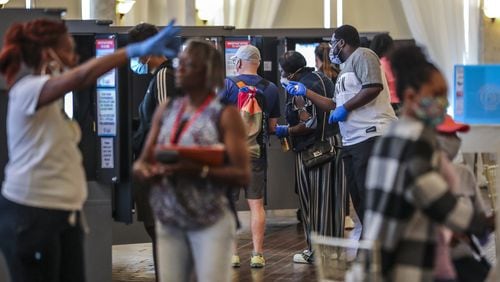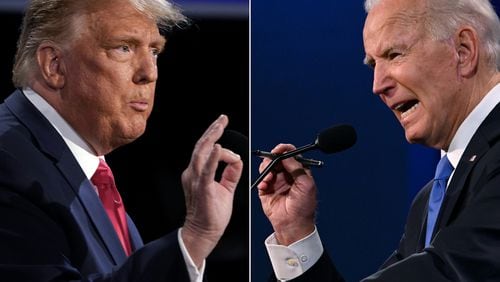A federal appeals court on Friday reinstated an Election Day deadline for Georgia voters to return their absentee ballots, overriding a judge’s decision that would have given voters three additional days during the coronavirus pandemic.
A three-judge panel of the 11th U.S. Circuit Court of Appeals decided 2-1 to grant a stay of a judge’s ruling to count ballots postmarked by Nov. 3 and received at county election offices by the following Friday.
The decision restored a state law setting Georgia’s absentee ballot deadline at 7 p.m. on Election Day.
The ruling will likely disqualify thousands of absentee ballots mailed close to Nov. 3 and delivered afterward by the U.S. Postal Service.
The number of late-arriving ballots could have been enough to swing close elections. During Georgia’s primary this year, election officials rejected about 8,400 absentee ballots that were received after the June 9 election day.
U.S. Circuit Judge Britt Grant wrote that Georgians have many opportunities to vote outside of Election Day polling places: They can request absentee ballots, return them in drop boxes or cast ballots during three weeks of early voting.
“Voters must simply take reasonable steps and exert some effort to ensure that their ballots are submitted on time, whether through absentee or in-person voting. Contrary to the district court’s conclusion, then, no one is ‘disenfranchised,’ ” wrote Grant, a former justice on the Georgia Supreme Court.
It’s unclear whether plaintiffs in the case will appeal. The New Georgia Project, a voting rights group, and its attorneys didn’t return requests seeking comment Friday.
The appellate court invalidated U.S. District Judge Eleanor Ross' ruling on Aug. 31 that voters needed additional protections during a public health crisis that has led to record numbers of absentee voters. So far, over 1.4 million Georgia voters have requested absentee ballots, a number that’s rising by more than 20,000 every day.
“We are glad the 11th Circuit recognized that long-standing Georgia law should remain in place for this election,” Secretary of State Brad Raffensperger said. “Georgia’s election officials have made it easier than ever for voters to meet that deadline by implementing online absentee ballot requests to streamline the request process and secure drop boxes to allow contactless return of absentee ballots.”
The panel’s majority found that the Election Day absentee ballot deadline doesn’t threaten voting rights. The judges also cited a U.S. Supreme Court precedent that cautions federal courts against mandating new election rules close to an election.
In his dissent, U.S. Circuit Judge Charles Wilson said the original ruling wasn’t unreasonable when it directed election officials to count absentee ballots received after Election Day.
“The district court’s conclusions, and the remedy it fashioned, are reasonable: It imposes a small burden on the state in order to avoid a more substantial burden on an individual’s right to vote,” Wilson wrote.
The appeal received the backing of the Republican National Committee and the Georgia Republican Party, which filed a friend-of-the-court brief supporting the Election Day ballot deadline. The brief said the deadline is constitutional both before and during COVID-19.
Georgia Republican Party Chairman David Shafer said the absentee ballot extension would have led to fraud and turmoil.
“Democrats have filed a barrage of frivolous lawsuits seeking to eliminate election safeguards, sow confusion, and upend the timely and accurate counting of votes,” Shafer said last week. “They cry ‘voter suppression’ but ignore the fact that an unlawful vote cancels out and ‘suppresses’ a lawful vote as completely as if the lawful voter was physically turned away from the polling place.”
Joining Grant in the majority was U.S. District Judge Barbara Lagoa, who had reportedly been considered for nomination to the U.S. Supreme Court after Justice Ruth Bader Ginsburg died Sept. 18.
Grant and Lagoa were nominated to the 11th Circuit by President Donald Trump; Wilson was a nominee of President Bill Clinton.
About the Author








